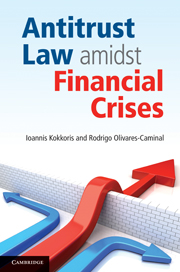Book contents
- Frontmatter
- Contents
- Foreword by Philip Lowe
- Foreword by Frederic Jenny
- Preface
- Table of cases
- Table of treaties and other international instruments
- Introduction
- 1 Introduction to competition law: EU, US and UK
- 2 Some notes on crises
- 3 Failing-firm defence
- 4 Efficiencies
- 5 Crisis cartels
- 6 State aid (Phedon Nicolaides)
- 7 Competition enforcement in periods of crisis
- 8 Conclusion
- Index
5 - Crisis cartels
- Frontmatter
- Contents
- Foreword by Philip Lowe
- Foreword by Frederic Jenny
- Preface
- Table of cases
- Table of treaties and other international instruments
- Introduction
- 1 Introduction to competition law: EU, US and UK
- 2 Some notes on crises
- 3 Failing-firm defence
- 4 Efficiencies
- 5 Crisis cartels
- 6 State aid (Phedon Nicolaides)
- 7 Competition enforcement in periods of crisis
- 8 Conclusion
- Index
Summary
We rarely hear, it has been said, of the combinations of masters, though frequently of those of workmen. But whoever imagines, upon this account, that masters rarely combine, is as ignorant of the world as of the subject.
Adam Smith (1723–90)The belief persists that cartels are in some devious way ‘unnatural.’ Yet nothing can be further from the truth. They are but one of several kindred species of a common genus whose ancestral tree is rooted in the sanctions which underlie the modern business system as a whole. They are not strange and deformed branches ruining an otherwise symmetric tree, nor deadly fruit feeding parasitically on the benign limb. On the contrary, they are as old as the history of business enterprise, for collusion, as Adam Smith clearly recognized in his time, ‘is the usual, and one may say, the natural state of things which nobody ever hears of.’
Prof. Robert A. Brady (1901–63)Introduction
Cartels generally involve price-fixing, market division, control of output, mitigation of technological improvement, limiting of production. Through cartels, ‘private’ interests may determine the level and distribution of national income, the level of employment, the stability of markets and general economic and political stability.
The impact of cartels has been identified since the early enforcement of competition law. Brady argued that in the presence of cartels the promotion of production, economic stability, the advance of science and technology and the improvement of the common welfare ‘are not – indeed, cannot be – primary but, at best, secondary objectives.
- Type
- Chapter
- Information
- Antitrust Law amidst Financial Crises , pp. 259 - 348Publisher: Cambridge University PressPrint publication year: 2010



